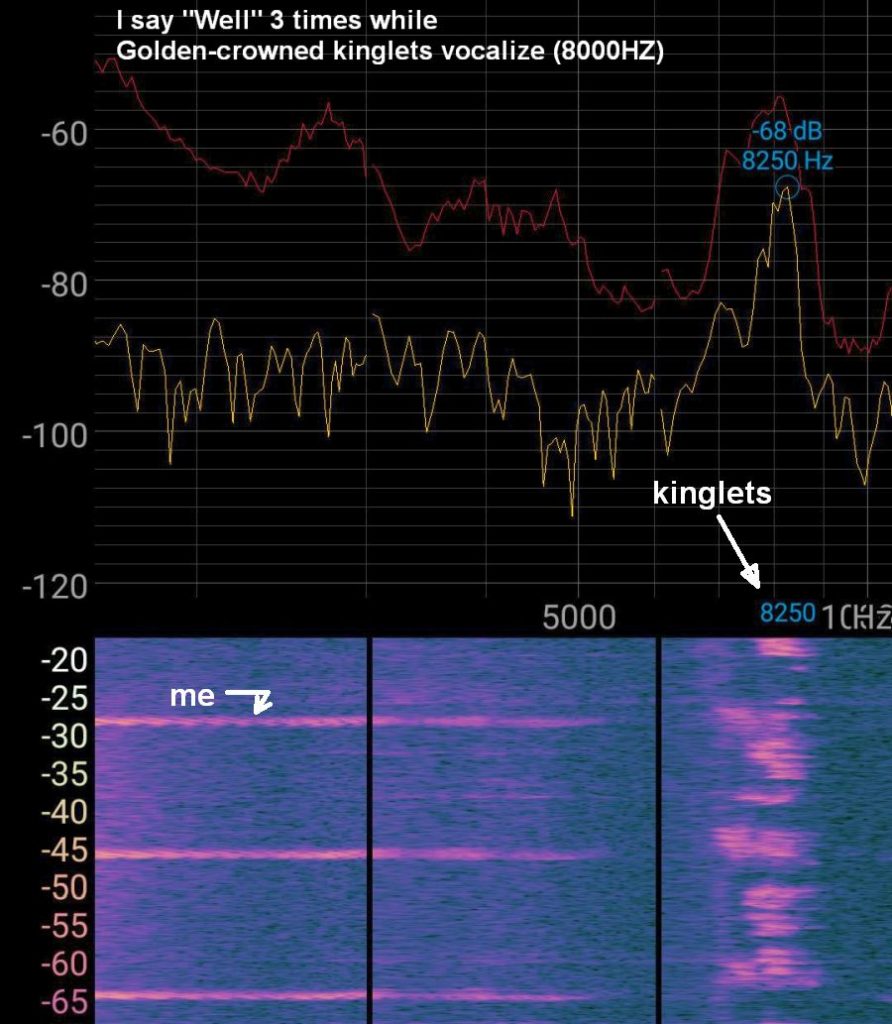27 March 2019
Can you hear the golden-crowned kinglets in this video? They are very loud but I can’t hear them at all, though I can see their beaks moving. Their voices are at a high frequency I no longer hear.
All About Birds explains:

Golden-crowned kinglets sing an ascending, accelerating series of up to 14 very high-pitched tsee notes lasting up to 3 seconds and sometimes ending in a musical warble that drops an octave or more in pitch. This is one of the first bird songs that people stop being able to hear as they age.
All About Birds, Golden-crowned kinglet sounds
If you can’t hear the kinglets you are probably over age 65, perhaps younger, and probably have age-related hearing loss. Presbycusis affects 1 out of 3 of people by age 65 and half of us by age 75. The CDC explains that “the most important sounds we hear every day are in the 250 to 6,000 Hz range.” Kinglets vocalize around 8,000 HZ.
What are HZ? Sounds cause vibrations and are measured in vibrations per second: 1 Hertz (HZ) is 1 vibration/second. High-pitched sounds vibrate faster than low pitched sounds so “high pitch” is also “high frequency.”
At birth humans can hear sounds from about 20 to 20,000 HZ but we start losing our upper range of hearing at age 18! Most of us don’t miss sounds above 17,000HZ but some teenagers in the UK will. They capitalized on the age-related hearing difference by creating a “mosquito whine” ringtone that teachers cannot hear. See and hear it on NPR.
The kinglets in the video are vocalizing at 7700 to 8400 HZ as shown in this graph from the Spectroid app on my mobile phone. The pink scale at the bottom shows the kinglets singing in the 8000 HZ area (at right) and my voice below 5000 HZ (long pink lines on the left). (Top graph shows loudness in decibels.)

So now I have two ways to see golden-crowned kinglets singing. I can watch their beaks or I can watch the Spectroid graph on my mobile phone.
Perhaps if I point my cellphone in the woods I’d see if any golden-crowned kinglets are out there.
p.s. Click here for a video that explains age-related hearing loss & helps you answer the question “How Old Are Your Ears?“
(photo of golden-crowned kinglet by Steve Gosser, Spectroid graph recorded by Kate St. John; video by The Wood Thrush Shop on YouTube)
Well, at least I know that my hearing is not too bad yet. Sometimes I worry I have hearing loss because I have trouble hearing people talk, but at least my high frequency response is still good. Now if I could just learn to identify the bird song I’m hearing! I’ll have to save this post and test my hearing every year.
Nice. Yes, it’s good to be able to hear at 8,000 Hz, but 4K Hz is more important for speech comprehension. And it’s when you start to lose 3K & 2K Hz that it really becomes critical.
Robert M Protz MS (PhD abd) CCC-A